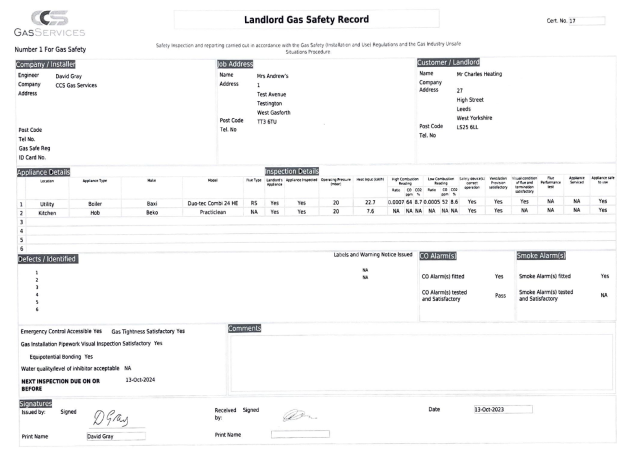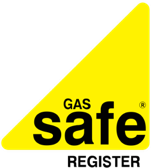Gas Safety Certificates CP12
Holiday Homes - Gas Safety Certificates CP12 From £50
We carry out a number of Gas Safety Certificates CP12’s for people that have holiday homes that they let out. We feel we offer great value for money and charge £50 which includes a gas boiler and a cooker / hob, any other appliances are charged extra.

CP12 certification, also known as a Landlord Gas Safety Certificate, is a crucial requirement for holiday homes equipped with gas appliances. This certification ensures the safety of both tenants and properties by confirming that gas appliances, fittings, and flues are functioning safely and in accordance with regulations. The certificate is issued following a thorough inspection by a qualified Gas Safe registered engineer.
For holiday homes, CP12 certification is not just a legal necessity but also a responsible step towards maintaining a safe environment for occupants. Gas appliances, like boilers, fires, and water heaters, are commonly used in holiday homes to provide comfort to guests. However, without proper maintenance and regular checks, these appliances can pose serious risks such as gas leaks, carbon monoxide poisoning, and fires.
To obtain a CP12 certificate for a holiday home, the property owner must schedule an annual inspection with a Gas Safe registered engineer. The engineer will examine all gas appliances, fittings, and flues to ensure they are in safe working condition. If any issues are detected, repairs or replacements will be recommended and carried out before the certificate is issued.
The CP12 certification process involves several key steps:
1. Appliance Inspection: The engineer will inspect each gas appliance to make sure it is properly installed, adequately ventilated, and in safe working condition.
2. Flue Examination: The flue, which is responsible for safely venting out combustion gases, will be inspected for proper functioning and adequate ventilation.
3. Gas Pressure Check: The gas pressure will be checked to ensure appliances are receiving the correct amount of gas for optimal performance.
4. Safety Devices: Safety devices, such as flame failure devices and carbon monoxide detectors, will be tested to ensure they are working effectively.
5. Ventilation: Adequate ventilation is essential to prevent the buildup of harmful gases. The engineer will assess the ventilation systems to ensure they are functioning correctly.
6. Combustion Analysis: The engineer will perform a combustion analysis to assess the efficiency of the gas appliances and detect any issues with combustion gases.
Once the inspection is complete and all appliances are deemed safe, the engineer will provide the property owner with a CP12 certificate. This certificate is a legal requirement and must be provided to tenants before they move in. Additionally, a copy of the certificate should be kept on file for at least two years.
Non-compliance with CP12 certification requirements can lead to severe penalties, including fines and imprisonment. More importantly, failing to maintain gas safety in holiday homes can endanger the lives of guests and damage the reputation of the property owner.
In conclusion, CP12 certification is a vital aspect of maintaining gas safety in holiday homes. It ensures that gas appliances are in good working order, reducing the risk of accidents, gas leaks, and carbon monoxide poisoning. By prioritising CP12 certification, property owners demonstrate their commitment to the safety and well-being of their guests, while also adhering to legal obligations. Regular inspections and certifications not only protect the occupants but also contribute to the overall positive experience of staying in a well-maintained and secure holiday rental.

